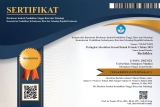Analysis of Sharia Maqashid on PKWT in the Job Creation Law Article 18 No. 35 of 2021
Abstract
This study analyzes the Fixed-Time Work Agreement (PKWT) in the Job Creation Law Article 18 No. 35 of 2021 through the perspective of Maqashid Sharia, focusing on the principles of Hifdzul Mal (property protection) and Hifzun Nafs (life protection). Indonesia's labor regulations were significantly changed by the Job Creation Law, including the removal of restrictions on the field of work that can use the outsourcing system. This change provides flexibility for the business world, but also poses challenges in protecting workers' rights. From Hifdzul Mal's point of view, this policy can improve business efficiency and encourage investment. However, from Hifzun Nafs' perspective, job uncertainty due to PKWT's flexibility has the potential to reduce workers' welfare. This research uses a qualitative method with a sharia maqashid approach that examines laws and regulations related to PKWT and the outsourcing system in the Job Creation Law. The analysis was carried out by examining legal documents, Constitutional Court decisions, and Maqashid Syariah theory to assess the implications of regulations on the welfare of workers and the business world. This research emphasizes the importance of comprehensive follow-up regulations and effective supervision mechanisms so that labor reform in the Job Creation Law can run according to the principles of justice and welfare in Maqashid Sharia.
Keywords
Full Text:
PDFReferences
Book
Asyhadie, Z. (2007). Employment law: employment law in the field of employment relations.
Asyhadie, H. Z., Sh, M., & Rahmawati Kusuma, S. H. (2019). Employment law in theory and practice in Indonesia. Half Pregnant.
Devi Rahayu, S. H. (2020). Textbook: Employment Law. Scopindo Media Pustaka.
Tahir, P., & Handayani, D. (2018). Islamic Law. The Earth of Scripts.
Chapters in the book
Senft, G. (1995). "Evil and Habit..." auf den Trobriand Inseln. Der Fall Tokurasi. Anthropos, 17-25.
Journal
Arafah, A., Anggraini, D., & Kinanti, S.C. (2024). Implementation of Sharia Principles in Islamic Financial Institutions. Studia Economica: Journal of Islamic Economics, (2), 186-193.
Hanifah, I. (2021). Opportunities for foreign workers to work in Indonesia based on the draft Job Creation Law. De Lega Lata: Journal of Legal Science, 6(1), 168-173.
Harahap, A. M., Harahap, M. I. M., Efendi, R., Daulay, M. N., & Ahmad, M. H. (2024). Challenges and problems in labor law from the perspective of Indonesia and Malaysia. Malaysian Journal of Sharia and Law, 12(3), 535-549.
Ibrahim, SDM, & Halkam, H. (2021). International Trade & Import Control Strategies. National University Publishing Institute (LPU-UNAS).
Lubis, R.R., Arfaizar, J., & Gustanto, Es. (2024). MANDATORY WILLS IN THE CONTEXT OF POLYGAMOUS WIVES: MAINTAINING EQUALITY AND JUSTICE WITHIN THE FRAMEWORK OF MAQASHID SHARIA. al-Mawarid Journal of Sharia and Law (JSYH), 6(1), 111-130.
Lumingas, N. (2013). Legal protection for outsourced workers. Lex et societatis, 1(1).
Maryono, M., & Markoni, M. (2023). Juridical Analysis of the Provision of Fixed-Time Work Compensation Money for Outsourcing Companies Based on the Job Creation Constitution. Indonesian Journal of Law, 2(1), 25-34.
Mariza, S., & Santoso, I.B. (2024). Understanding the Legal Implications of Regulatory Transfer: Post-Decision Analysis of the Constitutional Court No. 27/PUU-IX/2011 under the Omnibus Legal Framework. Sultan Jurisprudence: Journal of Legal Research, 4(1), 123-140.
Later, FJ (2018). Review of the Provincial Minimum Wage (UMP) for Employees of Private Companies according to Law No. 13 of 2003 concerning Manpower. LEX CRIMEN, 7(6).
Murtadho, I. (2023). The Principle of Determining the Minimum Wage in PERPPU No. 2 of 2022 concerning Job Creation from a Sharia Maqashid Perspective. Bulletin of Sharia Economic Law, 1(01), 35-42.
MUSTAHIK, D. T. K. SHARIA ECONOMICS STUDY PROGRAM, FACULTY OF ISLAMIC ECONOMICS AND BUSINESS, AR-RANIRY STATE ISLAMIC UNIVERSITY, BANDA ACEH 2022 M/1443 H.
Putra, C. A. G., Budiartha, I. N. P., & Test, N. M. P. (2023). Legal Protection for Consumers in the Perspective of Public Legal Awareness. Journal of Legal Construction, 4(1), 13-19.
Pratiwi, W.B., & Andani, D. (2022). Labor Law Protection with Outsourcing System in Indonesia. Journal of Law Ius Quia Iustum, 29(3), 652-673.
Saputra, R., & Hilabi, A. (2022). Actualization of Sharia Maqashid in the Construction of Fiqh Perspective on Sharia Banking Activities and Products. Al Maal: Journal of Islamic Economics and Banking, 4(1), 31-49.
Safa'at, M. A., S. H., M., Herlindah, S. H., Kn, M., Mirdinata, A. J., S. H., & Reka Dewantara, S. H. (2022). DEVELOPMENT OF ISLAMIC LAW: Its Existence, Relevance, and Challenges in Post-Reform Indonesia. Civilization Library.
Solekhah, S., Sah, M. R. K., Kusuma, M., & Hakim, A. (2021). Omnibus Law Job Creation and Islamic Economic Perspective on Labor. Ats-Tsarwah: Journal of Islamic Economic Law, 1(1), 16-29.
Syurkati, K. K. (2016). THE EXISTENCE OF OUTSOURCING AND ITS ROLE AFTER THE DECISION OF THE CONSTITUTIONAL COURT NUMBER 27/PUU-IX/2011. Scientific Journal of Administration', 7(1), 28-42.
Suyanto, H., & Nugroho, A. A. (2016). Legal Protection of the Rights of Outsourcing Workers Based on the Principle of Justice. Journal of Juridical Studies, 3(2), 61-74.
Dissertation
Assek, A. (2012). OUTSOURCING LABOR AGREEMENT SYSTEM REVIEWED ACCORDING TO ISLAMIC ECONOMICS (Doctoral dissertation, Sultan Syarif Kasim State Islamic University, Riau).
Arham, Andi Alwi. LEGAL ANALYSIS OF DECISION NUMBER 20/PDT. SUS-PHI/2022 CONCERNING TERMINATION OF EMPLOYMENT (Case Study at the Makassar Class IA District Court). Diss. Indonesian Muslim University, 2023.
ARINIE, D. (2024). ANALYSIS OF SUSTAINABLE BUSINESS IN THE ERA OF DIGITALIZATION IN AN EFFORT TO IMPROVE THE WELFARE OF BUSINESS ACTORS IN THE PERSPECTIVE OF ISLAMIC ECONOMICS (Study on Yellow Bamboo Traders Trade Center Bandar Lampung City) (Doctoral dissertation, UIN RADEN INTAN LAMPUNG).
CHANDRA, M. (2017). DEDUCTION OF WORKERS' WAGES IN A FIXED-TIME WORK AGREEMENT (Doctoral dissertation, Untag Surabaya).
MUNAWAR, M. (2024). EFFECTIVENESS OF LEGAL PROTECTION FOR WORKERS WITH FIXED-TERM EMPLOYMENT AGREEMENTS AFTER THE ENACTMENT OF LAW NO. 6 OF 2023 CONCERNING JOB CREATION REGULATION (Doctoral dissertation, Sultan Agung Islamic University Semarang).
FEBRIANTO, FEBRIANTO. RECONSTRUCTION OF THE REGULATION OF THE PROTECTION OF FIXED-TIME CONTRACT LABOR BASED ON JUSTICE. Diss. Sultan Agung Islamic University, 2023.
Willy, G. (2023). Labor Protection in Perpu Number 2 of 2022 concerning Job Creation is reviewed from the perspective of Maqashid Syariah (Doctoral Dissertation, UIN RADEN INTAN LAMPUNG).
Zahro, R.A. (2023). Legal Protection Problems for Workers on Fixed-Time Work Agreements are unwritten in law number 6 of 2023 concerning job creation from the perspective of Maqashid Syariah Al-Syatibi (Doctoral dissertation, Maulana Malik Ibrahim State Islamic University).
Statutes/Court Decisions
Article 27 paragraph (2) of the 1945 Constitution, concerning the right of citizens to get a decent job and life.
Government Regulation No. 35 of 2021, "Regarding Fixed-Time Work Agreements, Outsourcing, Working Time and Rest Time".
Article 76 of Law Number 13 of 2003 "Concerning Manpower (UUK) regulates the protection of women workers."
DOI: https://doi.org/10.21107/ri.v20i1.29628
Refbacks
- There are currently no refbacks.

Rechtidee is licensed under a Creative Commons Attribution-ShareAlike 4.0 International License.
Indexing and Abstracting:












